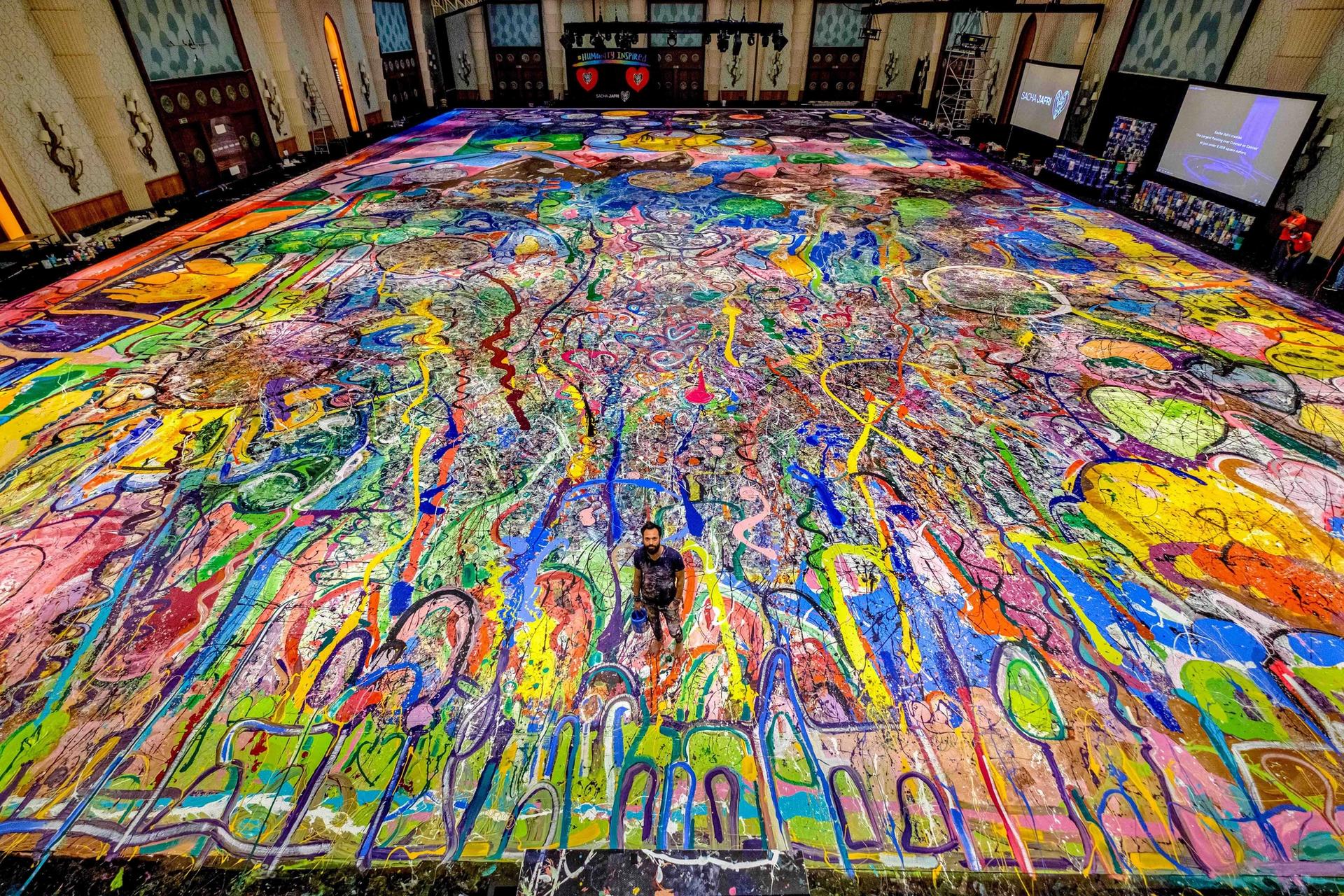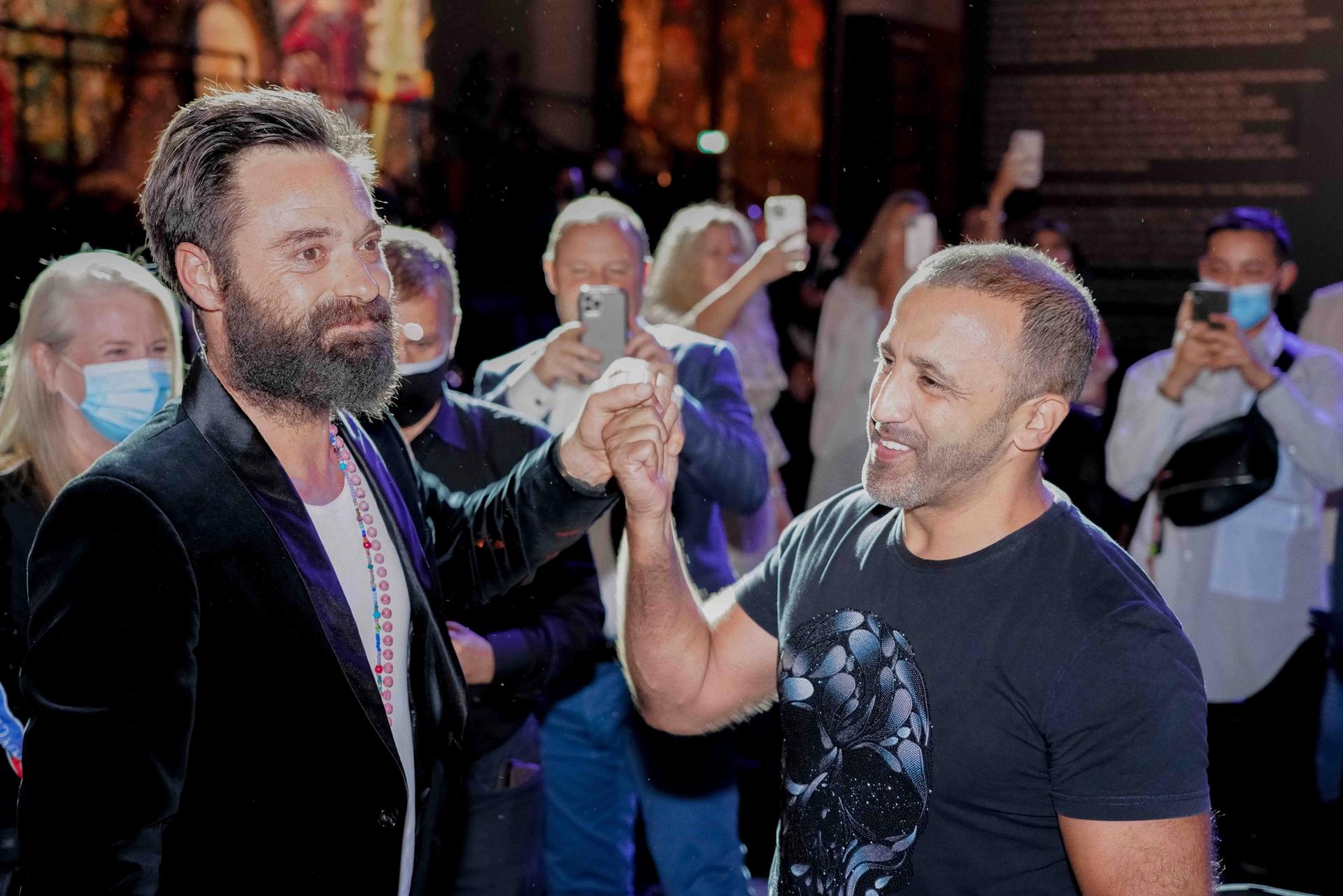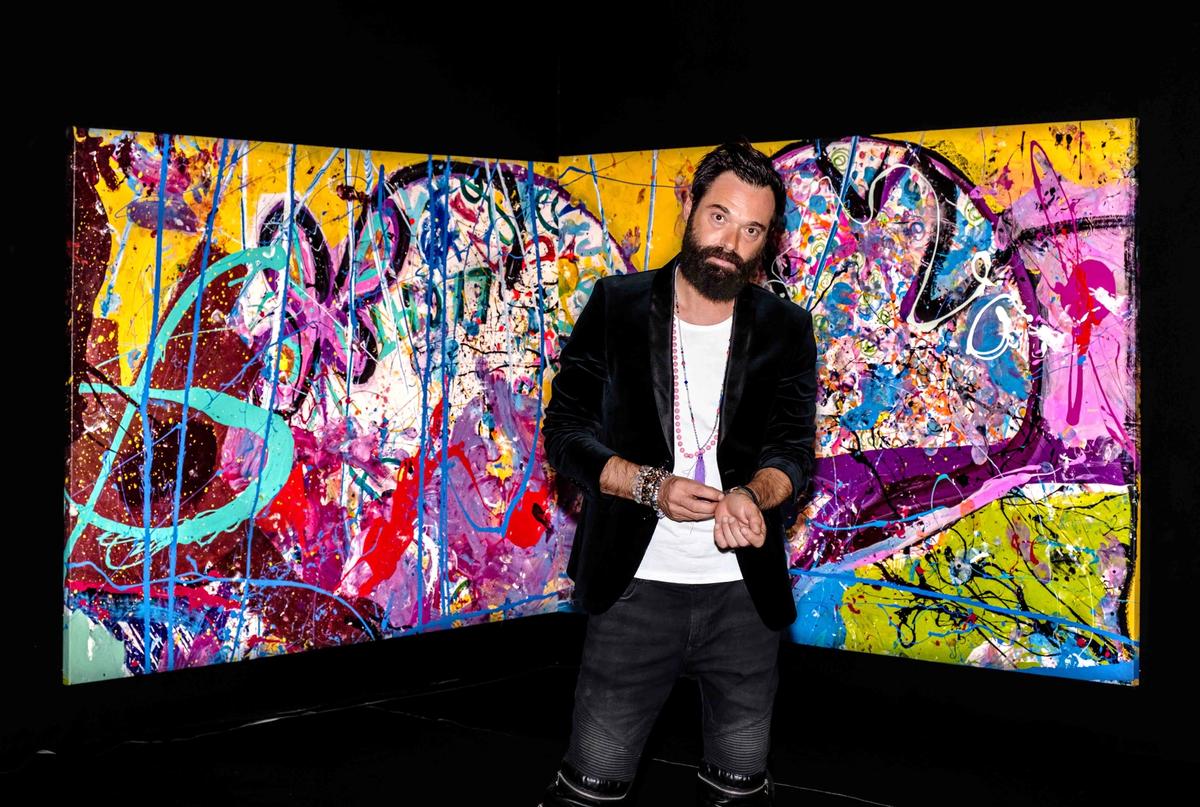Sacha Jafri may not be a well-known name in the global art community.
But the Dubai-, London- and New York-based artist has just become the fourth most expensive living artist at auction, behind David Hockney, Jeff Koons and, of course, Beeple.
Jafri's enormous 18,000 sq. ft. painting, The Journey of Humanity—which holds the Guinness World Record for the "largest art canvas"—sold in a charity auction in Dubai on 22 March for $62m. The sale was organised by the artist's “Humanity Inspired” initiative and all proceeds will be donated to four charities to fight child poverty: Unicef, Unesco, The Global Gift Foundation and Dubai Cares.
Remarkably, this was more than 900 times Jafri's previous auction record, judging by Artnet's price database, which says it stood at 2,160,000 TWD with fees ($70,745) for a painting sold at the Taiwan-based auction house Ravenel in 2019. Only yesterday, another painting being sold for charity had the knock-on effect of boosting an artist's auction record—Banksy's Game Changer, sold for £16.7m at Christie's.
The buyer of The Journey of Humanity was the French-born, Dubai-based French crypto-entrepreneur Andre Abdoune, the chief executive of Altius Gestion International Holding, who now plans to build a museum in Dubai to house the work.
Jafri painted the work during the Covid-19 lockdown in the vast ballroom of the hotel Atlantis, The Palm in Dubai. "I was in a trance, painting for eight months, 20 hours a day," he tells The Art Newspaper of the process. Jafri found himself stuck in Dubai when lockdown hit: "2020 was meant to be the biggest year of my career—I had my big 18-year retrospective at the Saatchi Gallery and I was doing a painting for Dubai Expo and the painting for the opening ceremony of the Tokyo Olympics. Then everything got cancelled."
Hence this project.

Jafri painting in the Atlantis ballroom, Dubai Courtesy of Humanity Inspired
Jafri felt "the world had become full of negative static energy" before the pandemic. Then: "Covid hit and there was a silence. And I had this vision in my mind of a painting that could evoke that silence and provoke really societal change."
At first he approached Emirates airline to use one of their aircraft hangars to paint the work but they suggested approaching Atlantis about using its ballroom. "I slept in the ballroom for eight months," Jafri says. "My wife and daughter had a room upstairs—I never got to sleep in it. And whenever my daughter was in the ballroom, it's a bit boring watching daddy paint for 20 hours so she played in her Wendy House in the corner of the room. So it was a surreal time. We were the only people in the hotel—my daughter was scootering around the Atlantis Hotel, totally empty."
Physically, it took its toll, he says: "I paint a bit like Pollock. I'm standing but I have to bend down to paint. This was a 18,000 sq. ft. canvas but I'm painting using a 1.5 inch brush, so you can do a lot of damage to yourself. I had an emergency back operation, putting a rod through my spin and putting fake cushioning between two of the vertebrae. My pelvis went out of line on both axis—my skeleton was out of line. And then my heels disconnected from my feet. It was insane. I was having painkiller injections every four hours in my hip."
Despite the painting being the size of two football fields, he says: "I had no helpers, no assistants, because I'm a bit of a control freak." Completing the painting used 1,065 brushes and 6,300 litres of paint, a homemade mix of household paints, artists' acrylics, linseed oil and raw oil pigment.
As for the canvas, Jafri says he got lucky: "I called a supplier who had a lot of canvas in the warehouse which had been intended for the Dubai Expo 2020, but that has been delayed of course".

Jafri with Andre Abdoune, who bought the painting Courtesy of Humanity Inspired
Once finished, the canvas was cut up and put on stretchers with the plan to sell the work as smaller paintings over six auctions, including one at the World Economic Forum in Davos. "I was going to be the first artist to speak at Davos in the main forum, we were going to do a dinner with the '150 of Davos' and sell works—with Bezos, Zuckerberg, all the big guys," Jafri tells us.
The work has hung on view in its entirety at Atlantis, The Palm for the past three months. "This guy kept coming in, with a thick French accent, and saying 'Sacha, you can't break up this painting, it would be a travesty.'" Jafri says. "He came in seven days in a row for about four or five hours a day."
That man was Abdoune.
At Monday night's auction, telephone bids came in from "Miami, LA, Mexico, South America, London, a lot in Switzerland—I guess that's all the boys who have made a lot of money in crypto—China and Hong Kong," Jafri says. "Then Andre bid at $50m and he got it at $62m."
Of Abdoune's intended museum, Jafri says: "The type of country it is, you might be helped out by the rulers, they might give us some land. We want to create a spiritual place, like Rothko's Church in Nevada." He adds they also hope to hold workshops for special needs and underprivileged children: "Fly them to Dubai for like a week, put them up—there will be living quarters where they can sleep. There will be a kitchen—it will be like a soup kitchen for the orphaned refugees of the world."
And to clarify, Abdoune is paying in dollars, not cyptocurrencies. "He's already made a sizeable deposit, and he is paying the rest in three instalments in three instalments over a six week period," Jafri says.


